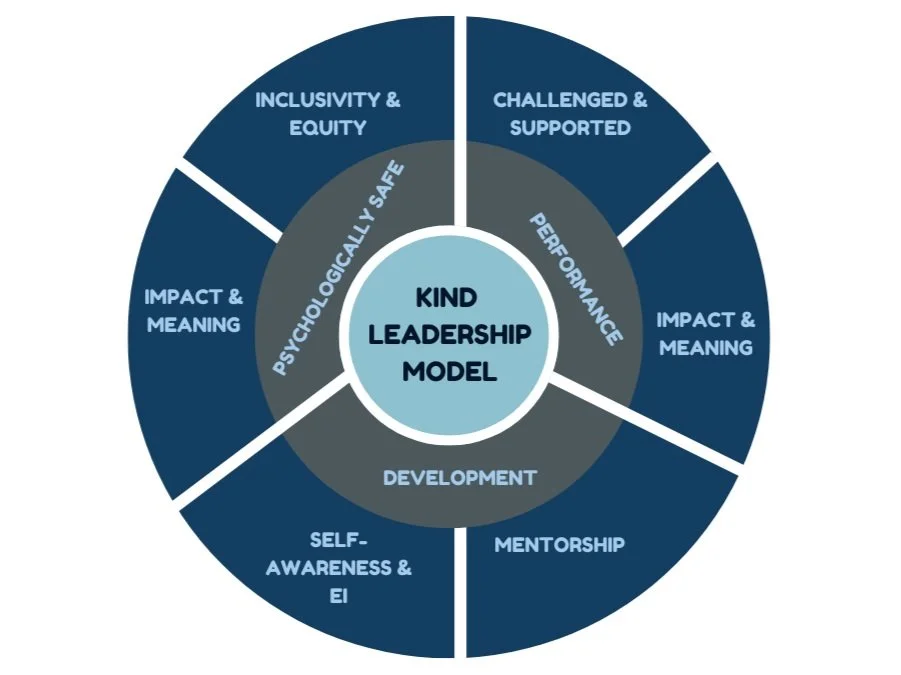Are You Finding Leadership More Demanding Than Expected?
Leadership is a broad term, often overused and misconstrued with management, making it hard to define in practice. If you're feeling caught up in day-to-day tasks rather than strategic thinking, or avoiding difficult conversations that need to happen, you're experiencing common leadership challenges.
True leadership is reflected in the small, everyday actions like saying hello, goodbye, or thank you. It also encompasses fundamental activities such as devising strategy, developing performance, inspiring followers, facilitating engaging and purposeful meetings, engaging teams etc.
Redefining Leadership with Kindness
Kind Leadership is a human-centred approach that embodies this activity, focusing on actionable practices such as creating collaborative working agreements with individual team members to build environments and performance that are sustainably beneficial to the people and the organisation.
When implemented effectively, you'll gain:
Clarity and confidence in your leadership decisions
More time to focus on strategic priorities rather than micromanagement
Stronger team relationships built on explicit understanding
Sustainable performance improvement across your organisation
Building Psychological Safety Through Explicit Working Agreements
Psychological safety...it's a term that's used a lot in leadership right now. You've probably heard it's about knowing that you feel included, that it's safe to challenge and ask questions.
But how do we bring that to life when you're facing resistance or hesitation from team members?
Through the Kind Leadership lens, psychological safety goes much deeper. At the heart of psychological safety is creating explicit working agreements. These are collaborative documents established between a leader, each individual team member and the leadership team. It clarifies what individuals and their managers need from one another to operate consistently at their natural best.
Example questions that are addressed in working agreements include:
What do you need from me to consistently perform at your best?
How could I get in your way?
What feedback do you want, and how often?
How do we address things if something isn't working?
Working agreements are a core component of Kind Leadership. They help create psychological safety and ensure mutual understanding of roles, responsibilities, and expectations. Unexpressed expectations often lead to confusion, resentment, disillusionment, frustration and ultimately departure. This foundation brings clarity to individuals and the organisation, even in times of uncertainty or conflict.
Ready to implement working agreements into your organisation?
If you find yourself constantly managing poor performers while high achievers get less attention than they deserve, our performance management approach can help you regain balance.
Performance management in Kind Leadership goes beyond setting goals. It is a collaborative, human-centred process that creates clarity, accountability, motivation and fairness by aligning an individual's work with organisational objectives.
In many organisations, performance management is underdeveloped or inconsistently applied. This gap creates ambiguity, anxiety, drains leadership capacity, and blocks overall team effectiveness. Properly implemented performance management transforms how people autonomously operate and how leaders can subsequently invest their time.
Without a consistently implemented performance management system, leaders often find themselves spending most of their time managing poor performers, those who avoid accountability in the absence of clear standards. Meanwhile, high performers, who are ambitious and driven, often don't receive the recognition or support they deserve.
By implementing proper performance management, every team member becomes equitably accountable for clear outcomes. Leaders regain capacity, freeing them to focus on strategic growth and team development rather than micromanagement.
Key elements of this process include:
Transparent and unambiguous SMART objectives evaluations
Regular feedback, coaching, and self-assessment
Recognition and support for high performers
Guidance and course correction for poor performers
When performance management is done well, it empowers leaders to lead effectively rather than manage reactively.
Reclaiming Your Time Through Effective Performance Management
Balancing People and Tasks:
The Leadership Challenge
Effective leadership requires the ability to balance the tension between the needs of people with the demands of tasks.
Some scenarios call for a task-focused approach, such as responding to urgent requests or driving critical projects to completion. In other situations, the priority shifts to people where supporting their wellbeing or providing the space they need becomes the focus.
The Kind Leadership approach is about the humanistic element woven through every decision. It's ensuring that leaders are equipped to assess each situation and determine where their focus should lie along this continuum.
Meet John Counihan
I've always been curious about leadership; what determines good leadership and how it can drive & inspire change. This curiosity fuels my passion for staying informed about the latest leadership research and trends. I find myself constantly exploring new ways to help leaders be at their best.
My journey began on the shop floor three decades ago and eventually evolved into the Head of HR before I started my own business. During my corporate career, I developed a growing interest in the "people agenda" and started introducing innovative practices to improve communication and collaboration amongst teams.
At one early point, I introduced regular team meetings in an operations environment (ridiculously obvious now), which were uncommon at the time, to share updates, address challenges, and improve communication. The success of these meetings inspired other teams to adopt the practice.
At every stage of my career, I've been drawn to understanding what drives individual and team performance. It led me to study leadership theory, organisational behaviour, and coaching & psychometrics extensively, but my solutions are always grounded in real-world application. I understand the pressures and challenges leaders face because I have lived them.
"John brought interesting tools, insights, questions and perspectives to us and through excellent facilitation he succeeded in creating an environment where all colleagues could contribute positively to what we wanted to build. I am very grateful to John for his support, care and interest in our team and I look forward to working with him again in the future.”
— Luke Hanlon, Managing Director of SuperValu & Centra








